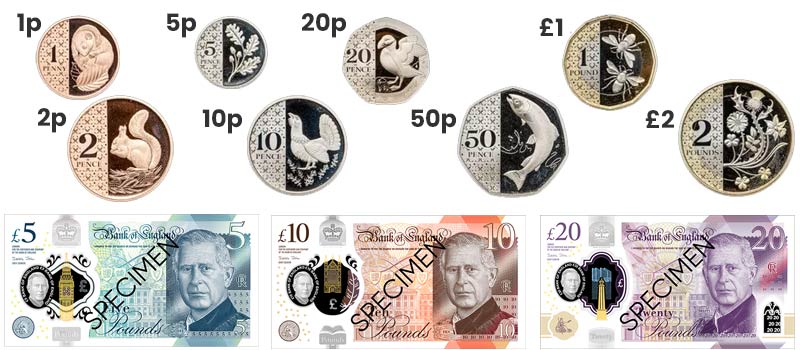
The currency of the UK is Pound Sterling (£). There are 100 pennies (also called pence or 'p') in one pound. Cash is widely used, but digital payments are now the more common way to pay for things, and there are now some situations where cash isn’t always accepted.

The £50 banknote is less common and is not always accepted, especially in smaller shops.
The Bank of England website provides guidance on how to tell if a banknote is genuine.
It is important to have a bank account:
You will find ATM machines on most high streets and in many public places. You can use the ATM of any bank. If they have the name of a bank on them, they will be free to use. Other machines can sometimes charge you to use them – but they always warn you of this on the screen. You can also get cash by going into your bank’s local branch.
You can transfer money abroad using your bank account – there is usually an option on your online account, or you can call your bank. Most banks will charge you for this. Even if they say there are no fees, they are usually transferring the money at a rate that is below the current exchange rate. An alternative is to use an online service such as Wise, who will usually provide the cheapest option for international transfers.
If you need to transfer money to someone you know, you can usually do this for free via your bank’s app, website or phone service. If someone you don’t know has asked you to transfer money, for example, when buying a second hand item from someone online, you should be careful. There are many scams, and you will have no protection if you make a transfer. You can consider using a payments service such as Paypal. If something goes wrong, you can then report the issue to Paypal, who provide protection if you are scammed.
If you've transferred money to a scammer within the last 24 hours, or if the scammer is currently in your local area, speak to the police now by calling 101.
There are also organisations that can give you free support and advice.
There is financial support available from the government for people who are out of work, have a low income, have a disability or are supporting someone with a disability. These payments are known as benefits. These are not loans, and you will not have to pay these back. The type of benefits you are eligible for will depend on your circumstances. Refugees are entitled to the same support as British citizens.
If you have bills and debts that you are unable to manage, there are many free support services who can help you. Some services will provide you with advice on how to manage the situation yourself, whilst others can provide very practical support, such as negotiating with the people you owe money to, managing your payments on your behalf, and processing a bankruptcy application for you.
